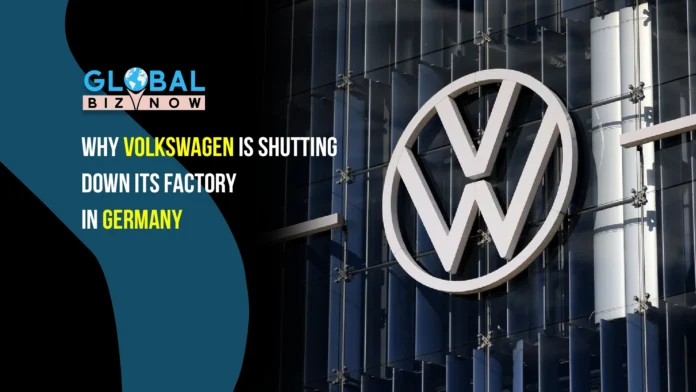Founded back in 1937 as one of the mainstays of the car-making industry and as an icon of German ingenuity, Volkswagen has slowly evolved into one of the world’s largest automotive manufacturers. Such iconic vehicles as the Beetle and Golf were indeed moulded to carry entire generations inside them, which not only defined generations but also set quality and innovation standards. VW continues a deep tradition rooted in its home country, significantly contributing to the latter’s economy and employment, an approach that perfectly suits the “German Mittel stand” school of manufacturing: precision, craftsmanship, and clever applied engineering.
As radical shifts hit the automobile market towards electrification and sustainability, Volkswagen has to endure relentless challenges, forcing some very tough decisions, such as closing down most of its factories at home. This restructuring is primarily driven by the need to help transition towards electric vehicles, respond to increased competition around the world, provide cost-cutting, and introduce new consumer preferences. Closing or revamping some of its old manufacturing plants will help Volkswagen realign itself with the future demands by ensuring relevance and competitiveness in this increasingly electrified market.
Why Closed?
Slow Demand: According to Chief Financial Officer Arno Antlitz, Europe’s automobile market has been much smaller than it was a couple of years ago before the onslaught of the COVID-19 pandemic. Volkswagen has fewer shares in the European market, and it is currently producing more cars than are sold. For example, in Germany, 360,000 electric cars have been sold in the first eight months of this year. Still, that is its lowest sales performance in more than two years, and the sale is even worse than in the same period in 2023, based on data from the VDA or German auto industry association.The drop in demand at the market will not be because of Volkswagen products but its overall general reduction in sales of cars throughout Europe.
Financial Performance: The operating profit in the first half of this year of the Volkswagen Group with SEAT, Skoda, and Porsche brands amounts to 10.1 billion euros, down 11% from the same period last year. While more sales have generated slightly more revenue, the profit margins have dropped even further because of more costs. The core models of the Volkswagen did comparatively well, but the luxury brands like Porsche and Audi did better. The core passenger car segment of Volkswagen suffered less in terms of earnings and profit margins in the second quarter compared with the previous quarter.The division bore the brunt of the restructuring costs, which include job buyouts. High labour costs and slow sales of electric vehicles are two of the major problems.
Transition to Electric Vehicles: The World Automotive Industry is in a massive shift from conventional internal combustion engines toward electric vehicles. It will demand new technologies, manufacturing techniques, and supply chains.. Volkswagen is investing heavily on EVs that are often different to produce compared to conventional automobiles. The old automaker had a hard time coming up with EV software. Many of its plants focused on EVs are operating at reduced capacity. Apart from VW’s internal issues with technology development, demand for EVs has slowed down in Europe due to the slow rollout of charging infrastructure and countries withdrawing subsidies. This will see some of the existing existing plants shut down or repurposed as they are not easily adaptable to EV productions. This strategic change is intended to position VW in line with market wants of the future and sustainability requirements but will see some of those legacy plants become uneconomic.
Cost-Cutting Measures: The global marketplace for automobile producers is highly competitive, where profit has become the critical objective. As such, VW unveiled several cost-cutting and efficiency programs, including possibly closing or shrinking those factories that do not produce at a better than the optimal rate. This will help decrease overhead costs; subsequently, the operations of the company will be streamlined in a manner that the savings can be used to purchase new technologies as well as EVs. This has been forced upon VW due to the swift changes within the industry.
It is pertinent that this strategic move has become unavoidable for the company under the global competition. Newer automotive players, specifically EV manufacturers, have increased the already present competition for a company like Volkswagen. Companies like Tesla, and many new start-up firms, slowly take away enormous portions of the market with innovative technologies and business models. Chinese companies have also intensified competition with less expensive electric vehicles. In this regard, VW needs to optimise its efficiency of operations by focusing its resources on areas that will be most lucrative in winning market share. Often, this is achieved simply by stripping the production to fewer, more advanced facilities rather than trying to keep many of the old plants in use if they are less efficient.
Systemic Supply Chain Issues: Supply chains globally saw systemic disruptions during the last couple of years ranging from a global shortage of semiconductors to the COVID-19 pandemic.These will be something carmakers had to think about in their production capacities and strategies. Critical for Volkswagen these days are to be able to pivot on a dime in response to supply chain constraints. For some producers, this has resulted in the temporary closing or scaling down of certain plants. As VW reacts to such realities, it may close the plants less central to future strategy or less flexible in responding to changeable conditions in supplies.
Market Demand Shifts: Consumer’s demand for greener and more technologically advanced automobiles dictates the nature of automobiles produced within a given time and locality. As such, VW strives to strategically make adjustments concerning the utilization of its resources to help it meet the new shifts in market demand. Existing facilities are likely not focused on the future direction of demand by EVs or unable to produce new models. In this reshuffling, VW is sure to shut and repurpose facilities that do not add value as pursued in strategic goals.
This makes the possible closing of Volkswagen’s plants in Germany a serious concern because of the historic role played by the company in the country. Since World War II, Volkswagen has been the face of German industrial success. Closing the plants not only affects employees but has broader effects on the automotive industry and overall economy of Germany.



